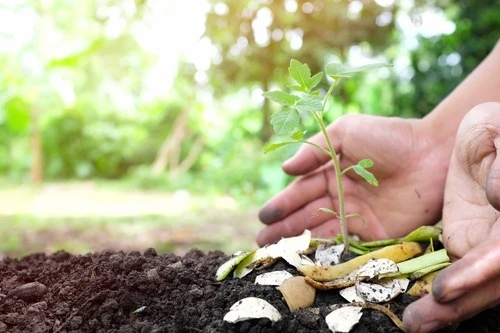Why Should You Start Organic Gardening at Home?
- Author: Saiqa Najeeb
- Last Updated On: June 27, 2023

Do you want to improve your health and the health of your loved ones? Do you want to reduce your impact on the environment? Or do you want to boost the productivity of your garden?
If your answer is YES to any or all of these questions, organic gardening is the answer. You can become part of this silent revolution by opting for sustainable and safe practices for growing plants.
If you’re unsure of whether to start organic gardening at home, this guide can help. In this write-up, we’ll take you through some solid reasons why you should start organic gardening at home.
Let’s get growing!
Health Benefits of Organic Gardening at home

The biggest motivation for starting organic gardening at home is to grow safe, nutritious food free of contaminants. Many gardeners hold the opinion that foods grown organically have a superior flavor. Recent research suggests that foods grown organically may contain more nutrients than foods grown conventionally. The hazards to human health from genetically engineered plants are avoided by organic gardening.
Substitute to Synthetic Pesticides

Pesticides are the biggest health and safety risk when it comes to gardening. The average American uses 4.5 billion pounds of pesticides annually, of which 1 billion pounds are synthetic pesticides, in their gardens, yards, homes, farms, and industries. Even though there is a complicated system of laws, guidelines, and labeling specifications, thousands of individuals each year become acutely poisoned by pesticides. Like most gardeners, organic growers may need to use pesticides from time to time, but they select them cautiously and only use the least hazardous organic sprays as their last option when all other control techniques have failed.
Contrary to popular belief, organic does not necessarily equate to nontoxic. In a strict sense, certain widely used organic pesticides are more harmful than some synthetic chemical pesticides. However, in comparison to synthetic chemical pesticides, which are made from petroleum and other chemical sources, organic pesticides, which come from animals, plants, and mineral sources, are typically less hazardous. More importantly, compared to synthetic pesticides, which can persist in the soil for decades, organic pesticides often degrade rapidly into harmless compounds.
Nutrient-rich food

The majority of organic gardeners can assure you that their homegrown produce tastes superior to that found in supermarkets. Are the foods also better for you? Some organically grown foods may be more nutrient-dense than their nonorganic counterparts, according to a four-year study program funded by European Union. The largest study of its kind also discovered that organically farmed foods occasionally had greater quantities of antioxidants, which are thought to be helpful in preventing diseases such as heart disease and cancer. Why are foods grown organically more nutrient-dense? Scientists are unable to speculate for sure, however, the following intriguing hypotheses may help:
- Research indicates that the soluble nitrogen fertilizer used in nonorganic gardens may force rapid but weak plant growth. These plants may also have lower levels of the antioxidants necessary to protect their own health, which are also necessary to protect our health.
- Foods produced organically may contain more nutrients because the soil is healthier. Numerous studies comparing the nutritional contents of various fruits and vegetables demonstrate an apparent drop in the nutritious content of food during the previous 70 years. Studies indicate that this reduction might be due to industrial agricultural systems relying on synthetic fertilizers rather than the soil-building methods favored by organic growers.
Environmental benefits of organic gardening at home
Protecting wildlife

Organic gardeners work to preserve a healthy ecosystem in which all living things, including garden pests, have a purpose. Instead of eradicating pests, they rely on harmless methods like row coverings and repellents to manage them. Organic gardeners promote the establishment of the pests’ natural predators by accepting the presence of some pests. Everyone benefits when predators and pests are in balance. Even organic gardeners may occasionally decide to use pesticides as a last option. They do so while keeping in mind that while pesticides kill pests, they can also harm other creatures. Organic gardeners prefer to use products that only have an impact on the pests they are seeking to control.
Helping pollinators

Pollination occurs when pollen is moved within flowers or from one flower to another of the same species, leading to fertilization and successful seed and fruit production. Some plants, like corn, are pollinated by wind. However, nearly 80 percent of the world’s crop plants, including alfalfa, apples, blueberries, cotton, and melons, depend on insects or other pollinators to transfer their pollen. According to the North American Pollinator Protection campaign, 30 percent of the foods we eat require the presence of a pollinating insect.
Minimizing water contamination

The U.S. Geological Survey conducted a decade-long study of pesticides in our nation’s surface water and groundwater. (Surface water includes aboveground sources, such as streams, rivers, lakes, and reservoirs. Groundwater flows below ground in cracks in bedrock and between soil particles, collecting in large saturated areas called aquifers.) Half of the U.S. population uses surface-water sources for drinking water; the other half gets drinking water from groundwater via dug or drilled wells.
Fertilizers pose an additional threat:
- Excess nitrogen and phosphorus fertilizers from lawns, farms, and gardens wash into streams, lakes, and oceans, where they contribute to excess algae growth. Densely growing algae depletes the oxygen in the water, which can kill fish and suffocate the native plant species.
- Nitrogen, the main element in most fertilizers, also moves easily through the soil, especially when mixed with water from rain, snowmelt, or irrigation, and enters the groundwater, contaminating wells and other sources of drinking water. High concentrations of nitrate — a common nitrogen compound — can be toxic to children younger than 6 months old and to other mammals, including cattle, sheep, and horses.
Conserving water

Although organic gardeners also need to water their plants, they take precautions to reduce usage, waste, and contamination. There are several strategies to conserve water, including grouping plants according to their water requirements, utilizing drip irrigation systems and soaking pipelines, minimizing the amount of turf that requires frequent watering, adding mulch, and watering only when necessary.
Rain barrels attached to gutters are used by some gardeners to collect and store water for later use. Some people create rain gardens, which are particularly maintained areas where rainwater is collected and allowed to soak into the ground rather than run off. It only makes sense to conserve this valuable resource, and many areas of the United States need it more than ever. that are currently experiencing severe drought
You've got the idea!
Organic gardening at home is not just a trend but a transformative lifestyle choice. It is a way to honor the earth, nourish our bodies, and foster a deep sense of connection with the natural world. By embracing organic gardening at home, we become guardians of the planet, caretakers of the delicate balance that sustains us all.
Now is the time to start your journey into organic gardening.


